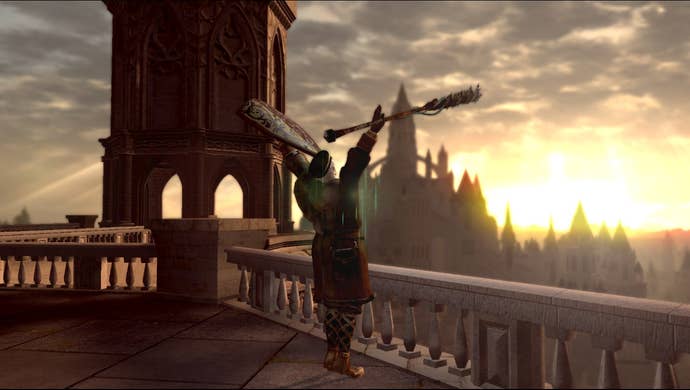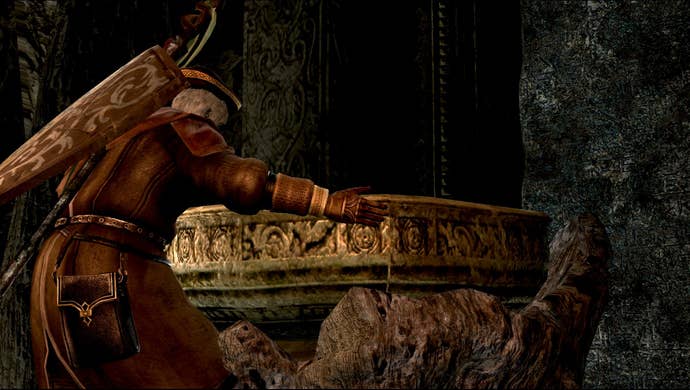Comfort Food Games: Dark Souls
Bob explains why, more than three years later, he just can't let this seminal action-RPG go.
This article first appeared on USgamer, a partner publication of VG247. Some content, such as this article, has been migrated to VG247 for posterity after USgamer's closure - but it has not been edited or further vetted by the VG247 team.
I had a good week-and-a-half to kill over this past holiday break, and I planned to spend it responsibly by diving into my extensive backlog of unplayed games. (Travel is for people who don't write for a living.)
That kind of happened. I made a bit more progress in some games and finally pulled the trigger on a few others, but an old friend managed to pull me away from this admirable goal. Scrolling through my all-too-large games grid on Steam, the logo for Dark Souls caught my eye; I'd put the game aside entirely thanks to last year's constant stream of content for its sequel, and wanted to jump back in for a bit in to remind myself of the differences between the two.

If you have any familiarity with Dark Souls, you may understand why "for a bit" quickly ate up 25 hours of my holiday—not consecutively, thank god.
Given that you're probably a regular USgamer reader, my love for Dark Souls shouldn't be all that surprising—if you add up all the writing I've done about the series over the past few years, the resulting book would be heavy enough to bludgeon someone to death. Still, plenty of my favorite games don't receive replays all that often: The Legend of Zelda: Majora's Mask is in my personal top five, yet I've only finished it three times (with my last playthrough taking waaay back in 2007). Even when I really like a game, I need a few years to pass before I touch it again, so my memories can fade to the point where a replay is worthwhile.
Dark Souls, on the other hand, escapes this self-imposed rule entirely. Since it's a game that incentivizes and rewards mastery, each successive playthrough only adds to your sense of empowerment. That first slog through Lordran to the first pair of intimidating bosses—the Belfry Gargoyles—probably took me 10-12 hours on my first try, and now I can make it there before the clock hits 60 minutes. The Depths, which once left me confused with its labyrinthine layout and terrified with its curse-inflicting, creepy basilisks, now seems starkly straightforward and mostly danger-free. Even Ornstein and Smough—two of the hardest bosses in gaming, to be sure—barely make me break a sweat these days, though a lot of that can be due to how much FromSoftware upped the boss challenge factor for their Dark Souls II DLC. (I still have Fume Knight nightmares.)
That isn't to say the only appeal of replaying Dark Souls comes from plowing through a game that once had me at its mercy. Every time I return to the world of Lordran, I somehow pick up on something new: a background detail, item description, or mechanical element that managed to escape me in the past—that's incredibly impressive for a game that's already eaten up over 200 hours of my life. For example, this time around, I learned if you somehow lose all of your stamina while on a ladder (an incredibly rare occurrence), your character will fall backwards off of it and comically flail to the ground. It's a tiny, insignificant detail that doesn't affect the game much, but still, something I had no idea could happen in all of my hours with Dark Souls.

Dark Souls replays aren't just about digging up these previously overlooked details, though: thanks to the game's generous supply of customization options, every character you create has the potential to be completely unique from those created in the past—you're not just exploring a barely different skill tree. This holiday marks the first time in Dark Souls history I actually chose to roll with a Strength build, which ditches long-range attacks entirely in exchange for pure, brute force. Since I didn't have the benefit of firing away at enemies from afar, I had to develop new strategies for a more direct offensive approach—which proved especially tricky with some of the bosses I once cheesed with exploits. Even after spending so much time with Dark Souls, this experience felt alarmingly fresh, and gave me a greater sense of respect for how many viable ways you can approach the many obstacles FromSoftware sticks in your path.
I'm not so sure if games of the Xbox 360/PlayStation generation will age quite as well as the 8 and 16-bit games that feel so easy to jump back into, but, even so, it's hard to ignore Dark Souls' status as a modern classic. That may sound a little hyperbolic, but, as a critic, it's hard to avoid viewing everything through the Dark Souls lens once you've sunk a significant amount of time into it. Whenever another game reigns me in, holds my hand, or forces me through unnecessary tutorials, I can only think back fondly to how Dark Souls let me run free through its world, without a single interruption, from minute one. And that fact that there's still so much to explore all these years later means I have plenty of reasons to go back when the mood strikes me. Dark Souls, I don't know how to quit you, and that's perfectly alright—my list of deathbed regrets is a mile long at this point, so what's another 500 hours?
